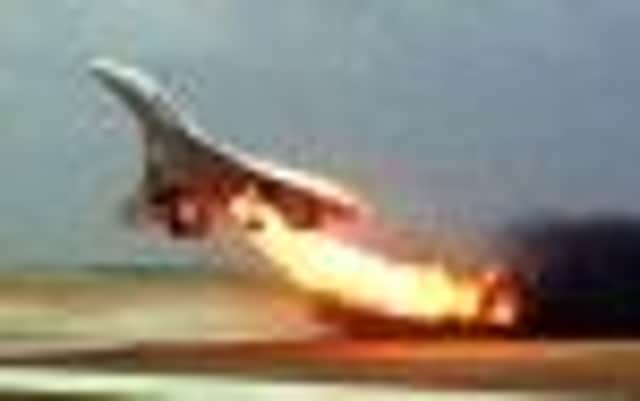Concorde crash conviction against airline overturned by French court


The crash hastened the end for the already faltering supersonic Concorde, synonymous with hi-tech luxury but a commercial failure. The aircraft, jointly operated by Air France and British Airways, was taken out of service in 2003.
In the accident, which occurred on 25 July, 2000, the jet crashed into a hotel near Paris’s Charles de Gaulle Airport soon after taking off, killing all 109 people aboard and four on the ground. Most of the victims were Germans heading to a cruise in the Caribbean.
Advertisement
Hide AdAdvertisement
Hide AdA mistake made weeks earlier and thousands of miles away by Houston-based Continental mechanic John Taylor played a crucial role in the crash, the court found.
According to the original ruling, the mechanic fitted the wrong metal strip on a Continental DC-10. The piece ultimately fell off on the runway in Paris, puncturing the Concorde’s tyre. The burst tyre sent bits of rubber into the fuel tanks, which started the fire that brought down the plane.
But the Concorde’s design left it vulnerable to shock, according to judicial investigators who said officials had known about the problem for more than 20 years. The lower court ruled that although French officials had missed opportunities to improve the Concorde over the years, they could “be accused of no serious misconduct”.
Stephane Gicquel, head of a group of victims’ families, said yesterday’s ruling left them with “a sense of powerlessness”. He added: “The court says the plane shouldn’t have flown. It did fly, but no conclusion is drawn.”
A French court initially convicted Continental Airlines and the mechanic in 2010 for the crash, and imposed €2 million in damages and fines on the carrier.
Parties, including Air France and Continental, compensated the families of most victims years ago, so financial claims were not the trial’s focus – the main goal was to assign responsibility. In France, unlike in many other countries, plane crashes routinely lead to trials to assign criminal responsibility – cases that often drag on for years.
“This was a tragic accident and we support the court’s decision that Continental did not bear fault,” Megan McCarthy, a spokeswoman for United Continental said in a written statement. Continental merged with United in 2010.
At the time it was launched, the Concorde supersonic jet was the height of luxury, flying between New York, London and Paris in less than four hours, instead of a standard flight of seven hours. Flying west, British Airways boasted, the flight’s well-heeled travellers could effectively arrive at their destinations before they left.
Advertisement
Hide AdAdvertisement
Hide AdIt returned to service as air travel demand was in decline following the 11 September, 2001 terrorist attacks on New York, but traffic never recovered on the supersonic jet. The last commercial flight was in October 2003.
Most of the victims’ families agreed not to take legal action in exchange for compensation from Air France, EADS, Continental and the Goodyear tyre manufacturer.